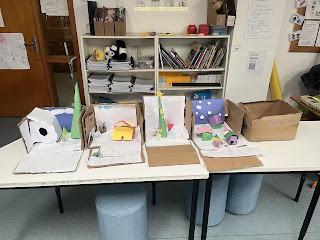The Power of Inquiry in Nature - Article Written for Zhuhai International School
With the start of the Year 3 Sharing the Planet unit, we have been spending some time on our wonderful school campus, observing the flora and fauna. We are really lucky to be in the location that we are in, in terms of all of the opportunities we have to engage in learning in the outdoors.
Year 3 has been spending time outside doing both Mathematical and Scientific observations. In terms of Mathematics, we have been looking at the symmetry we can find in nature. We went outside to find once living and natural materials and then brought them back to class to sketch. Students were also invited to look at pictures of other plants and animals in books, in order to further examine the concept of symmetry. Moving forward we will go back into nature (onto school campus, and the beach) to look at the different shapes that we can find.
For our scientific observations, students were closely observing their environment and writing or drawing about what they saw / writing their questions. Through close and careful observation students were amazed to learn new things about their campus. We found trees with spikes near the front of the school in an area where the students rarely go. We found something that seemed like cotton on the ground, and theorized that it came from a nearby tree. We found a type of grass that had seeds that you could blow away just like dandelion seeds. In terms of animals, we also saw a snail, spiderweb and various butterflies and moths.
- What kind of flower is this?
- Why is the bamboo so tall?
- Where does this thing like cotton come from?
- Why is the snail out on a sunny day? Won’t he dry up?
And more!
Some of these questions are easy to answer, others may take some time. Some questions dealt with students’ own pre-conceptions. It’s questions like these that can fuel student interest and curiosity and lead to deep learning. Careful and curious observations of nature make a natural inquirer out of many of us!
As an adult it’s always a pleasure to see where children want to take me, in their quest of curiosity. They noticed things outside that I had never noticed before, and together we stopped, slowed down, enjoyed our time outside and observed.
Teachers could also naturally think out loud and try to further the students’ thinking:
- Why are palm trees so tall and thin?
- I wonder why a plant would have seeds that would be so easy to blow away in the wind.
- What makes it so a bamboo plant can bend so much without breaking?
As an inquiry-based teacher my favourite thing is when a student asks a question and I can honestly say, “I don’t know, write down the question and then maybe we can find out!”
In any area of a child’s life, if children have the opportunity to observe plants, animals, weather, landscapes and other parts of nature, it is a great way to get children thinking and forming questions naturally, on their own.
Children are natural inquirers. Even adults, we have our own power to wonder and think and marvel at the world around us!
Slow down. Observe. Spend time in nature. Question. Inquire. Drive curiosity and wonder.
Let's all take a moment to marvel at the world around us!






Comments
Post a Comment